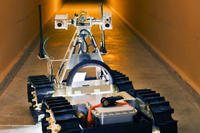-
Leeds sludge experts target nuclear waste
Researchers from the University of Leeds have teamed up with Sellafield Ltd. to clean up radioactive sludge produced by the U.K. nuclear industry; the newly formed Sludge Center of Expertise will play a key role in describing the behavior of the sludge wastes that have arisen after years of operation at Sellafield and other nuclear sites across the United Kingdom
-
-
Formation of Senate and House rare Earth minerals caucuses urged
The Association for Rare Earth yesterday urged the creation of Senate and House caucuses to focus on the challenges of securing supplies of rare Earth elements for U.S. high technology, clean energy, and defense communities
-
-
OmniTouch turns any surface into a touch screen

Researchers at Microsoft and Carnegie Mellon have created a shoulder-mounted device that can turn virtually any surface into an interactive touch screen; with OmniTouch users can now use walls or even the palm of their hands to control their smartphones
-
-
$35 tablet runs on three watts of power

Developers are now ready to ramp up production on an ultra-low power $35 tablet device after a year of testing in a remote Indian village
-
-
Fighting terrorism by changing narratives
DARPA’s “Narrative Networks” project aims to find out how susceptible some people are to “narratives” (oral stories, speeches, propaganda, books, etc.) which might dispose them to engage in terrorist actions — and then replace such offer such people “better” narratives
-
-
Flight control software helps pilots stick carrier landings

Navy and Marine Corps aviators conducting carrier landings today line up with a moving flight deck in a complicated process; they must constantly adjust their speed and manipulate the aircraft’s flight control surfaces — ailerons, rudders, and elevators — to maintain the proper glide path and alignment to the flight deck for an arrested landing; new software makes landing much easier
-
-
Laser keeps an eye for spoiled food

Minced meat, bread, fruit juice, and many other foods are packaged in a protective gas which extends their shelf life; there is currently no good method to check whether the packaging has the correct gas content — and thus, whether the content is spoiled or not; researchers have developed a new laser instrument which could solve the problem
-
-
A new pest threatens U.S. agriculture -- iPhone owners can help
A new meandering pest — the brown marmorated stink bug (BMSB) — is feasting on many of North America’s most important crops, posing an unprecedented threat to U.S. agriculture; the value of susceptible crops in the thirty-three states where BMSB has been established or sighted exceeds $21 billion
-
-
Arab Spring is different thing for different people
New research shows true picture of what and who is behind the political uprisings; although the idea of the “Arab Spring” is accepted by a large proportion of people in Arab countries, the reasons they are aligning themselves with it are very different and have grown more diverse the longer it has gone on
-
-
Sandia's rescue robot wins technology prize

The remote-control robot contains color video cameras, a thermal imaging camera, microphones, and sensors that act as eyes and ears for rescue crews and provide air-quality information; two-way audio enables survivors to communicate with rescuers
-
-
L-3, Virginia Tech in cybersecurity partnership
L-3 Communicationshas formed a cooperative partnership in cybersecurity research and development with Virginia Tech’s Ted and Karyn Hume Center for National Security and Technology; the company says that this new partnership will enhance L-3’s ability to deliver innovative national security solutions
-
-
Lockheed Martin hosts 150 Md. students in cybersecurity event
Top performing Science, Technology, Engineering and Mathematics (STEM) high school students from Maryland gathered yesterday at Lockheed Martin’s NexGen Cyber Innovation & Technology Center to explore cyber security careers, education, and to promote safe online practices through a series of lessons and interactive stations
-
-
Also noted
Radar seeing through walls | Computer virus did not target US drone fleet: general | Salmon-Killing Virus Seen for First Time in the Wild on the Pacific Coast | Irvine Sensors Signs Definitive Agreement to Sell Thermal Imaging Business | SAIC Partners With McAfee to Offer Enterprise Ready Protection From Zero Day and Reconnaissance Attacks
-
-
Software restricts access to sensitive to specific locations
Researchers have created software to remotely put smart phones under lockdown — an innovation that could aid labs doing sensitive research, secure government and military facilities, and keepers of medical records
-
-
Waste glass cleans up water

A simple method converts waste glass into a material which can be used to remove pollutants from contaminated water; the method uses colored glass which is being stockpiled in the United Kingdom as there is less recycling demand for green and brown bottles than there is for clear bottles
-
More headlines
The long view
New Technology is Keeping the Skies Safe
DHS S&T Baggage, Cargo, and People Screening (BCP) Program develops state-of-the-art screening solutions to help secure airspace, communities, and borders
Factories First: Winning the Drone War Before It Starts
Wars are won by factories before they are won on the battlefield,Martin C. Feldmann writes, noting that the United States lacks the manufacturing depth for the coming drone age. Rectifying this situation “will take far more than procurement tweaks,” Feldmann writes. “It demands a national-level, wartime-scale industrial mobilization.”
How Artificial General Intelligence Could Affect the Rise and Fall of Nations
Visions for potential AGI futures: A new report from RAND aims to stimulate thinking among policymakers about possible impacts of the development of artificial general intelligence (AGI) on geopolitics and the world order.
Smaller Nuclear Reactors Spark Renewed Interest in a Once-Shunned Energy Source
In the past two years, half the states have taken action to promote nuclear power, from creating nuclear task forces to integrating nuclear into long-term energy plans.
Keeping the Lights on with Nuclear Waste: Radiochemistry Transforms Nuclear Waste into Strategic Materials
How UNLV radiochemistry is pioneering the future of energy in the Southwest by salvaging strategic materials from nuclear dumps –and making it safe.
Model Predicts Long-Term Effects of Nuclear Waste on Underground Disposal Systems
The simulations matched results from an underground lab experiment in Switzerland, suggesting modeling could be used to validate the safety of nuclear disposal sites.
